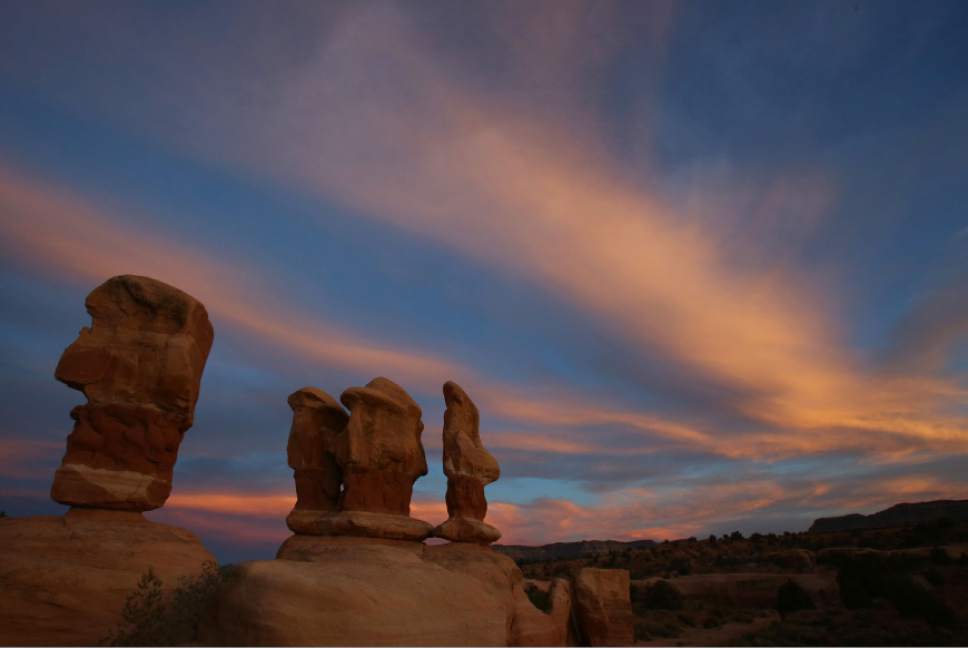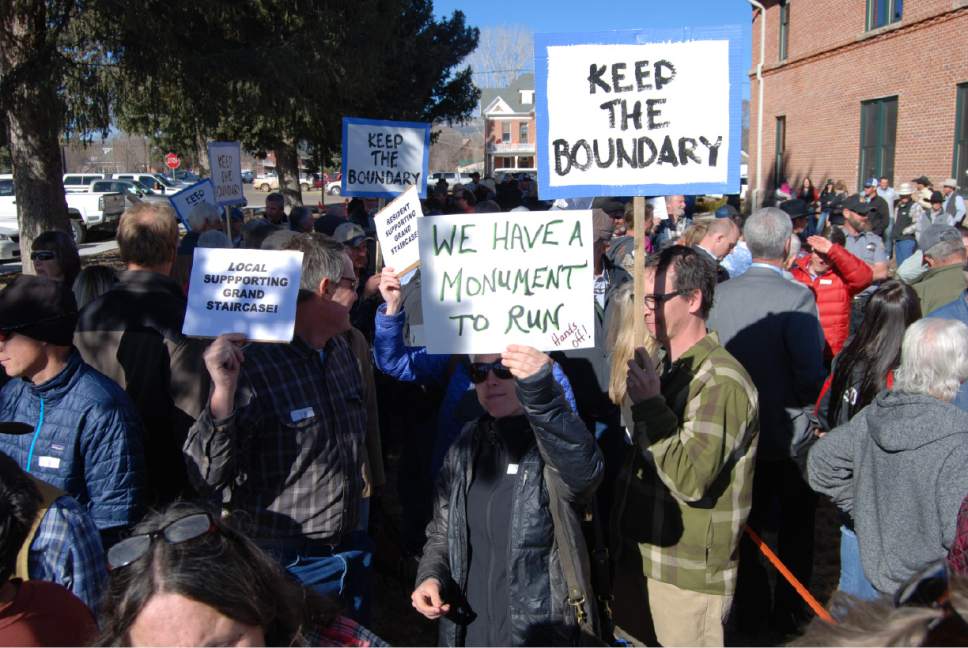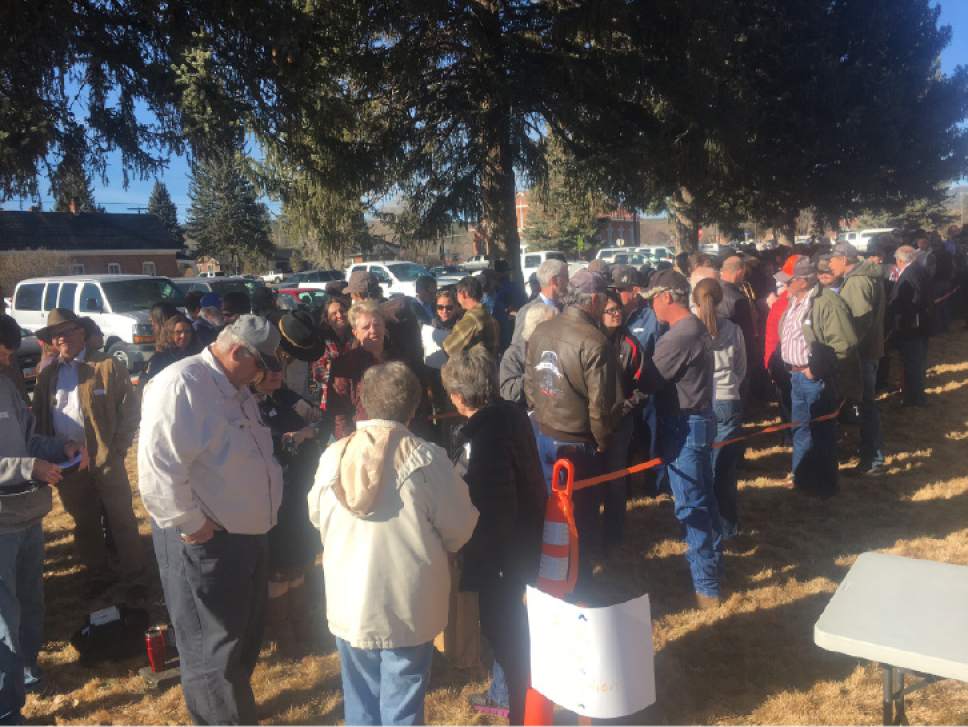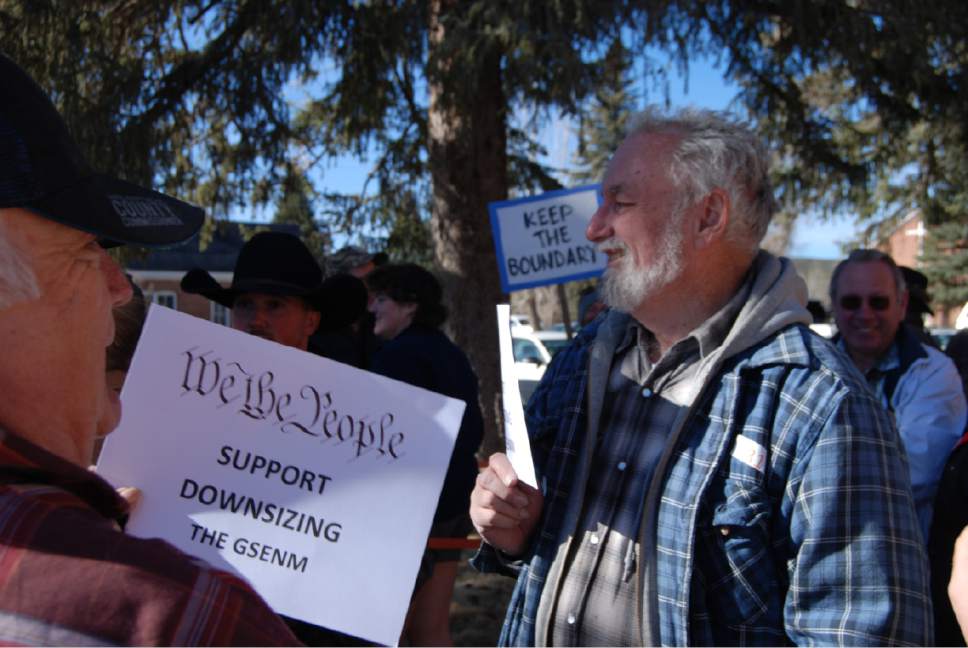This is an archived article that was published on sltrib.com in 2017, and information in the article may be outdated. It is provided only for personal research purposes and may not be reprinted.
Panguitch • Supporters and detractors of Grand Staircase-Escalante National Monument faced off Monday inside and outside the Garfield County Courthouse, where county commissioners fielded public comments then passed a controversial resolution calling for downsizing the 1.9 million-acre monument.
"We could cut that in half and still have plenty of room to protect everything there that needs to be protected," said Planning Commission Chairwoman Elaine Baldwin, a former Panguitch mayor. "We have been shut down when we tried to do something with economic development. We need to bring back sawmills, and we need to bring back industry to Garfield County."
Monday's event highlighted a growing disconnect between entrepreneurs who have moved to Garfield County and elected leaders who claim the monument has undermined the county's customs and heritage, based largely on ranching and natural resource extraction.
Over the past two decades since President Bill Clinton issued a surprise proclamation creating the monument, however, businesses have sprung up or expanded in Boulder, Tropic, Escalante and other towns along State Route 12 to serve visitors drawn to the region's rugged beauty and solitude.
Escalante-Boulder Chamber of Commerce President Dennis Waggoner polled his 49 members and not one supported downsizing the monument.
"We are all having record years, employing more people and spending more on investment," said Waggoner, owner of an Escalante restaurant and guide service. "This is the lowest in unemployment taxes I will pay in 14 years. We pay $500,000 in payroll and benefits."
At least 100 people on each side of the debate gathered Monday morning in front of the county's historic courthouse. Only a small portion of them could be seated in the commission chambers. Partisans treated one another respectfully.
The commission fielded comments of up to two minutes from 12 speakers on each side before unanimously voting to approve the resolution, based nearly verbatim on a successful resolution before the Utah Legislature, sponsored by Rep. Mike Noel, R-Kanab.
"The monument doesn't have sufficient funding to protect its resources," Commissioner David Tebbs said. "That's an indication that it is too big."
The Bureau of Land Management, which runs the monument, has closed historic roads and locked up lands from traditional activities that were promised, such as heritage tours, family reunions and wood gathering, Tebbs said.
But business operators and other resolution opponents showed up in Panguitch on Monday to establish a clear record of local support for the monument to share with decision makers at the Department of Interior, now headed by former Montana Congressman Ryan Zinke.
At a March 2 meeting in Boulder, most of those in attendance opposed the resolution, according to Mayor Bill Muse.
"No maps of the boundary changes sought by the county are available for evaluating the real impacts of this action," Muse said. Boulder residents have adapted to the monument, he said, so changing boundaries could disrupt the community, now home to successful guesthouses, restaurants and outfitters.
Few if any opponents at Mondays hearing were banking on blocking the resolution, since Commissioners Leland Pollock and Jerry Taylor, a former Escalante mayor, had already given full-throated support for the resolution in testimony to state lawmakers.
"It's not anything to celebrate. It's a curse to a county," Pollock told a Senate panel.
But critics said the resolution paints a negative picture of Garfield's economic outlook, is based on misinformation and asserts unfounded allegations about the monument's impact on rural communities.
"Boulder and Escalante are thriving, houses are being built, new businesses opening up, job opportunities increasing," Muse said. "The county did not contact any Boulder elected officials or residents for input on the resolution. Our residents feel they have no voice in matters that have major implications for our community."
Muse, school board member Cheryl Cox and others said the resolution sends the wrong message, suggesting that Garfield is closing schools and is a terrible place to do business.
"Federal red tape and overreach has driven more business from our county than anything this resolution can do," countered Lance Syrett, a member the family that has operated Ruby's Inn outside Bryce Canyon National Park for decades. He argued the tourism industry would benefit from greater economic diversification
"I am not against tourism. I am against people using tourism as a whip to stop those other things," said Escalante City Council member Greg Allen. "Tourism jobs are secondary jobs. They can't afford to live there on $10-an-hour, seasonal part-time jobs."
Noel opened and closed the hearing with remarks deeply critical of the monument's creation and the regulations that he says stymie multiple use of the land.
Noel asserted the monument designation's primary, yet undisclosed, purpose was to stop the proposed Smokey Hollow coal mine on the Kaiparowits Plateau and to ensure Clinton's 1996 re-election.
Commissioners in Kane County, home to the monument's southern half, already have passed a similar resolution and were set to discuss Grand Staircase's impact on local culture and heritage at their Monday meeting.
Kanab's City Council, meanwhile, will vote on a monument-shrinking resolution Tuesday.
bmaffly@sltrib.com Twitter: @brianmaffly









